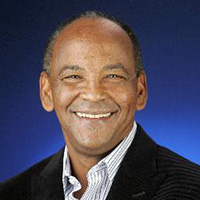These days, it may seem like an unlikely climb to the executive suite, but the man who made it thinks California needs to remember a time when his own personal journey wasn’t so unlikely.
Noel Massie was raised in East Oakland by a single mom who had four children. Massie went to Berkeley High School and then worked his way through San Jose State University, took a job with United Parcel Service and did what successful people always do.
He worked hard and good things happened.
 Massie left his job as president of the $190-million Southern California District of UPS to take an even bigger job in Atlanta. The 38-year UPS veteran is now the U.S. Operations Manager for the logistics giant.
Massie left his job as president of the $190-million Southern California District of UPS to take an even bigger job in Atlanta. The 38-year UPS veteran is now the U.S. Operations Manager for the logistics giant.
But his heart and his passion for California remain firmly rooted. And he worries about the future of California’s workforce.
“In the last several years, California has made a 180 degree turn, and people are starting to get it,” said Massie in a recent interview with California Forward.
The California Economic Summit, not coincidentally, has identified and has been working on the workforce preparation issue since its inception in 2012. Thanks to that work and other workforce training advocates like Massie, the California Legislature is poised to approve a $200-million career technical education funding package that will give California’s community colleges more resources to address the needs of California’s regional economies, which are desperate for certified middle-skill workers.
One of the Summit’s challenges is to train the one million middle-skill workers that California will need over the next decade.
Massie thinks that is a good idea, and urges California to take the long view.
“The need for a two-year degree or better is required for two-thirds of the jobs in this country,” he pointed out. “We aren’t producing enough of them.”
What will that mean for companies in the future?
“Companies figure it out,” Massie said. “They’ll often go a different way–use technology and reduce jobs.”
For a manpower-driven, leading company like UPS, they are answering their own challenges.
“We build a self-education platform where we invest in our employees to help further their education and their skills, and, of course, we’ll use automation like drones and other new tactics to help us achieve our goals.”
At a recent Global Trade and Logistics meeting in Los Angeles, the UPS team was taking applications from the dozens of community college students who attended. These part-time jobs can lead to careers in the company.
“We look for smart, hard-working people and we like to grow them,” said Massie. “We’ll hire someone out of Stanford, but he or she is going to learn to load a truck.”
But, something needs to be done about the “big gap” in the talent pipeline that Massie, a former board chair of the Los Angeles Area Chamber of Commerce has to deal with.
“The state must be completely engaged,” he said, ”but the private sector has a role to play as well.”
Massie says a good example of this is the trend of regional businesses working with community colleges to align courses so that they're relevant and useful for today’s jobs.
But Massie strongly believes the public investment needs to start much earlier.
“Pre-school education, particularly for kids who live poverty, is a must. We know by the third grade pretty how much a student is going to do. The numbers show we can and must do much better.”
And for Massie, whose two sons have or will graduate from college, the cost of tuition is another issue for today's workforce.
“When I went to San Jose State, I worked part-time and made enough to live and to pay my tuition. Young people leaving college today are saddled with mortgage-like debt and that’s not sustainable,” he said.
He added that California was the world leader in education when he was younger and that returning to a day when tuition was affordable and education excellence was achieved is a goal California should again strive to attain.

